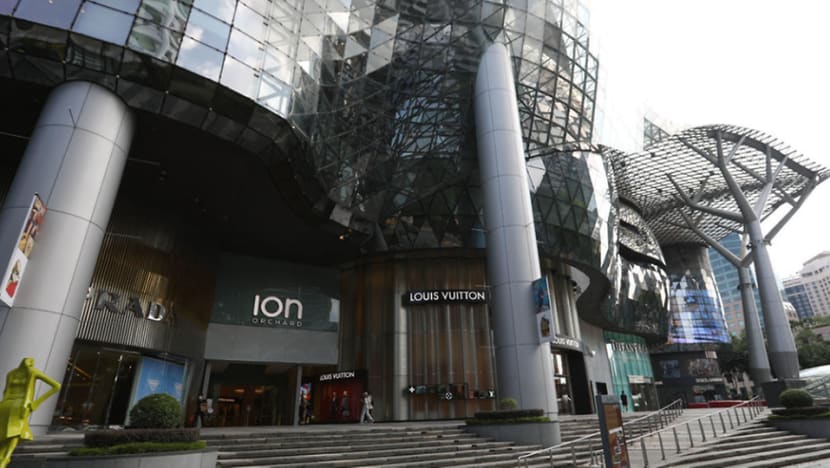Retail property outlook: Can malls woo digital shoppers with experiences they can't find online?
The COVID-19 shakeup is only the latest in a series of challenges faced by Singapore’s retail property sector. Money Mind looks at what it will take to attract shoppers back to the malls.

ION Orchard mall along Orchard Road. (Photo: Raj Nadarajan/TODAY)
SINGAPORE: Avid shopper Kelly Chiew has not been to a bricks-and-mortar mall in two years.
The 28-year-old buys everything online – from everyday consumer goods to big ticket items including S$40,000 worth of renovation items.
Kelly is not alone. More shoppers are going online - and this has accelerated during the COVID-19 pandemic.
According to data from the Urban Redevelopment Authority (URA), retail property prices have been on a general downtrend since the first quarter of 2016.
On the e-commerce end, the proportion of online spend has tripled in the past three years.
This lower footfall is pressuring rentals. Retail rents started falling at the beginning of 2020 and have been declining for seven straight quarters, according to URA data.
Despite this, Cushman & Wakefield’s Wong Xian Yang believes that a retail recovery could come in 2022.
“What will support rents further is a limited supply of new retail space," said Mr Wong, who is Cushman & Wakefield’s head of research in Singapore.
"New retail supply will only come in at about half a million sq ft per annum over the next few years. This compares to about 1 million sq ft from 2016 to 2019. Retail rents could recover by about 1 to 2 per cent, with suburban malls taking the lead.”
SUBURBAN AND CITY FRINGE MALLS
Suburban and city fringe malls have been more resilient during this current downturn.
URA data showed that median rentals for this region have decreased around 12 per cent since the fourth quarter of 2019, compared to a 16 per cent decline for malls in the Orchard area, and a 14 per cent decline for CBD malls.
At the same time, the vacancy rate at suburban retail spaces is also lower than that at the Orchard and downtown core areas.
"Suburban vacancy rates, they are at their lowest in about five years, at about 4.8 per cent as of the third quarter of 2021. This compares to about 8.1 per cent for islandwide vacancy. I mean, to give you some additional context, Orchard, and downtown core vacancy rates remain relatively high at about over 11 per cent as of third quarter of 2021," said Mr Wong.
The drivers are in place for suburban malls to continue to grow.
Once seen as just neighbourhood centres, they have transformed into destination shopping areas with luxury and international brands, said Mr Wong.
The continued adoption of remote working will also support footfall in suburban commercial areas.
However, Mr Wong said Orchard Road remains Singapore’s prime shopping destination, with large international brands still seeing it as the preferred location for their flagship outlets.
With shoppers now used to the convenience of online shopping, the challenge for the sector is to optimise the retail experience for consumers.
Ms Yeo Mui Hong, CEO of Orchard Turn Developments which manages Ion Orchard, said the company’s main focus is on what she calls retail-tainment.
“We constantly engage our tenants for unique shopping experiences ... For the past two years we've introduced close to 20 new to market, flagship new concept brands in Ion Orchard. We constantly refresh our tenant mix to keep our shoppers interested to make them want to come back for more,” said Ms Yeo.
Property developer Lendlease, whose portfolio includes Jem and Paya Lebar Quarter, is banking on concept-driven retail offerings.
According to Ms Jenny Khoo, its head of asset operations, this was already the focus pre-pandemic and COVID-19 simply sped up the process.
To stay connected with digitally savvy consumers, Lendlease will make use of social platforms to help its retailers market and promote their products.
As retailers and shoppers learn to live with COVID-19, online and offline will have a place in every shopper’s heart.
Both channels of shopping are complementary and can add value to the whole shopping experience.
As Orchard Turn Developments’ Ms Yeo puts it: “Humans are social beings. The human touch is very important. And the human touch is something that online shopping will never be able to replace.”


















